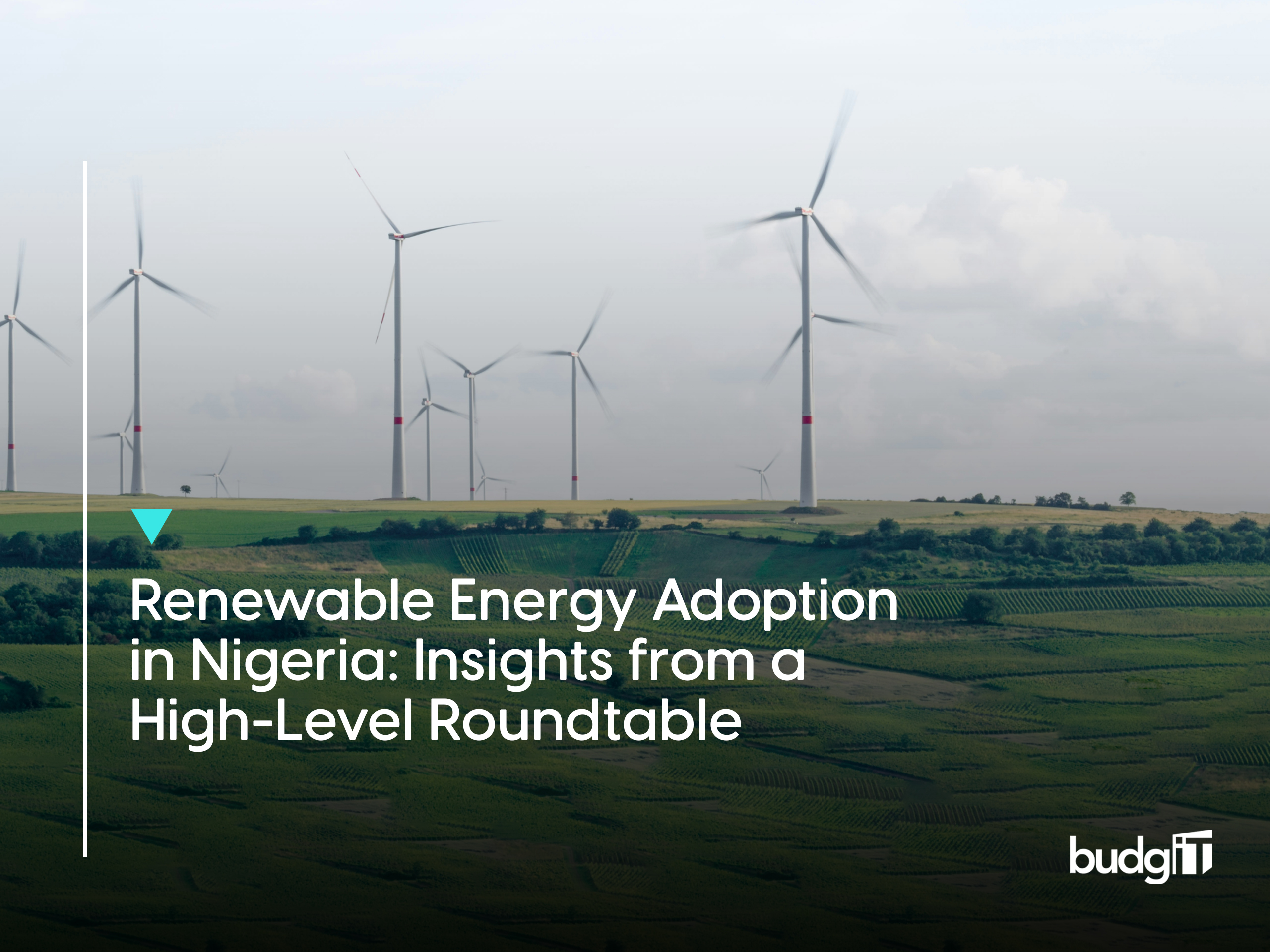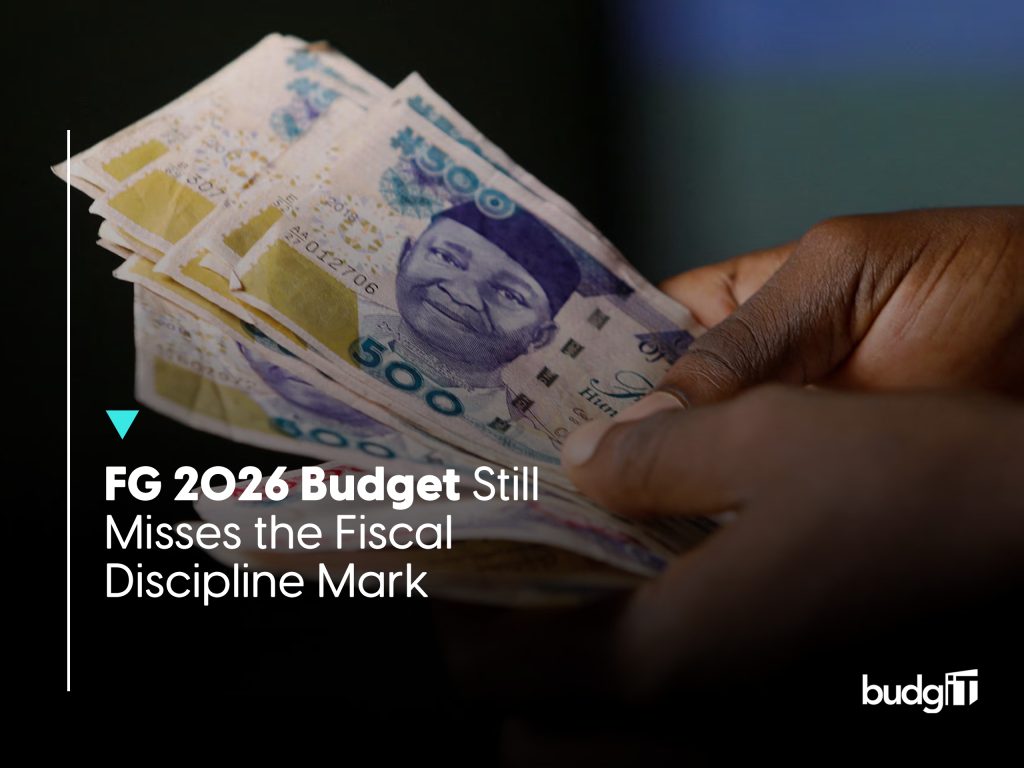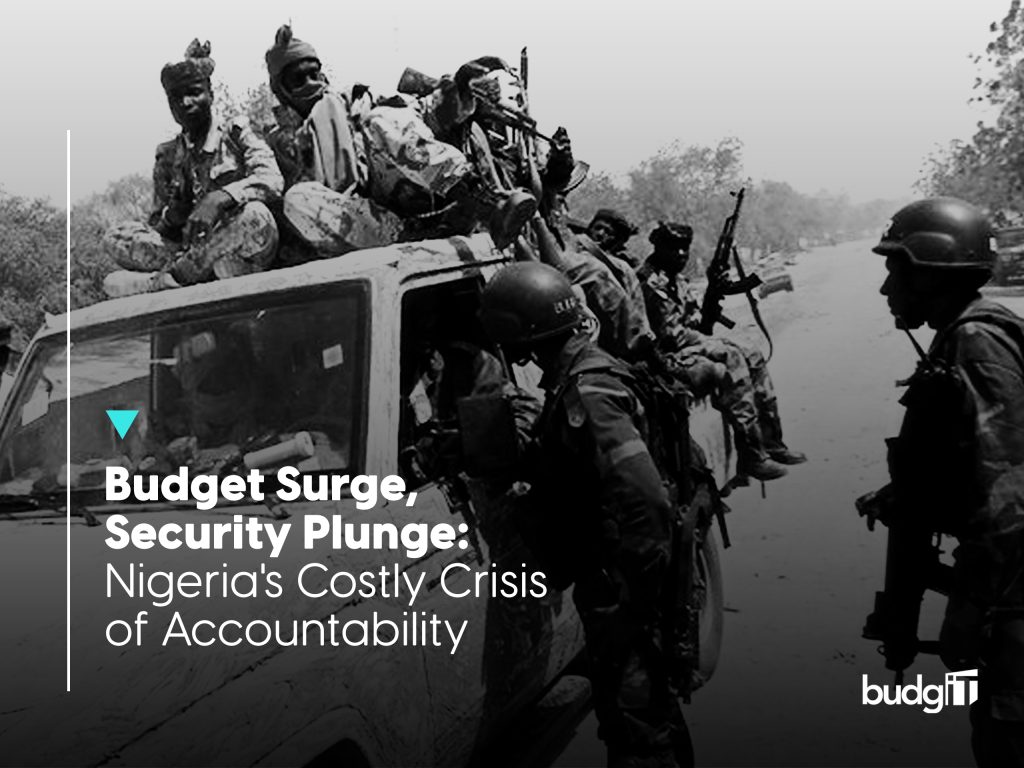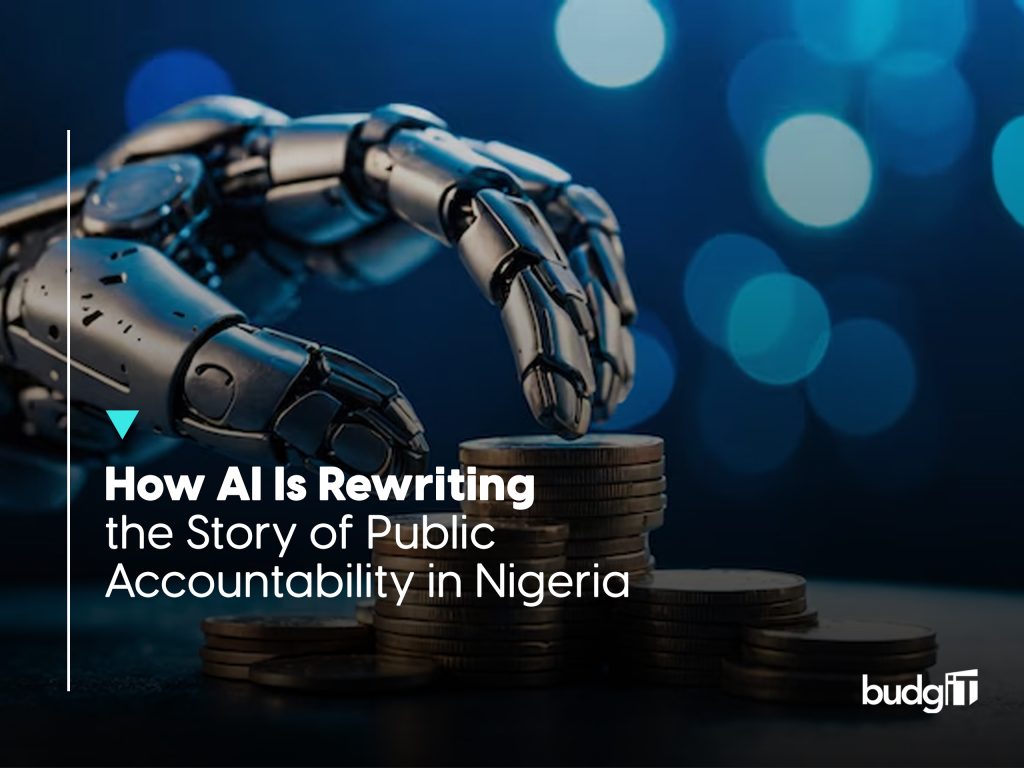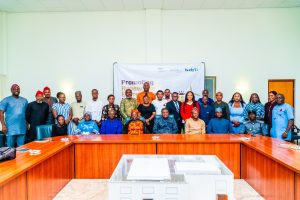
On July 2, 2025, BudgIT Foundation, through its Natural Resources and Climate Governance team, with support from Publish What You Pay (PWYP) Nigeria, hosted a transformative high-level roundtable discussion in Abuja, themed Promoting Renewable Energy Adoption in Nigeria. This event brought together a diverse group of participants, including representatives from government institutions, the private sector, civil society, and academia, all of whom shared a vision of accelerating Nigeria’s transition to clean, reliable, and sustainable energy. The dialogue provided a robust platform to address the challenges, opportunities, and actionable strategies necessary to scale renewable energy adoption nationwide. Below is a comprehensive overview of the roundtable, its key discussions, and the path forward for Nigeria’s energy transition.
To begin the conversation, Gabriel Okeowo, BudgIT’s Country Director, opened the roundtable by emphasising the critical need to accelerate renewable energy adoption in Nigeria. With over 85 million Nigerians currently without electricity, a figure projected to rise to 120 million by 2030 due to a population growth rate of 3% outpacing electrification efforts at 1.1% annually, urgent action is essential.
Building on this, Enebi Opaluwa, BudgIT’s Head of Natural Resource and Climate Governance, said the roundtable provided a much-needed platform to discuss existing challenges, gaps and opportunities in Nigeria’s clean energy transition, noting that the roundtable was convened to look at how we can increase renewable energy advancement in Nigeria, examining the nuances and offering practical, implementable solutions. He pointed out the fragmentation in Nigeria’s renewable energy policies, advocating for harmonised frameworks to guide government and private sector efforts effectively.
On her part, Alice Adedayo, BudgIT’s Research Analyst, gave a presentation on renewable energy advancement in Nigeria: nuances, challenges and solutions, providing an overview of Nigeria’s energy landscape. She noted that while electricity demand stands at 31.2 terawatt-hours, about 40% of the population still lacks access. The grid remains dominated by gas-fired thermal power (over 80%), yet faces frequent supply constraints.
She highlighted hydropower as Nigeria’s leading renewable source, with solar PV gaining traction, especially in rural and off-grid areas. If national plans are fully implemented, renewables could supply nearly 60% of energy demand by 2050.
Alice also referenced key developments such as Nigeria’s $200 million partnership with WeLight and the EU’s €10.4 million initiative across five states. However, major barriers persist, including financing gaps, policy fragmentation, high import tariffs, technical skills shortages, and insufficient energy storage. Her recommendations included boosting infrastructure and research, improving access to financing, and deepening public-private collaboration to drive renewable energy progress.
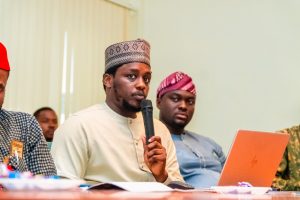
Speaking at the event, Myzammil Waziri from the Rural Electrification Agency (REA), representing the Managing Director, Mr Abba Aliyu, talked about accelerating rural electrification to improve Nigeria’s electricity rate. He highlighted the agency’s efforts to address the electricity access gap through decentralised solutions, such as mini-grids and solar home systems. “The REA has identified that approximately 700,000 communities are without electricity, representing 24% of the population,” he said. To electrify these areas, the agency employs three main strategies: grid extension, isolated solar and battery mini-grids for entire communities, and individual solar home systems for smaller, dispersed settlements. In terms of impact, he highlighted some of REA’s achievements, noting that over 7.8 million people have been impacted with clean energy, more than 1,100,000 connections have been achieved, and 11,400 MSMEs have been impacted to date.
Sharing a civil society perspective, Dr. Erisa Danladi, National Coordinator of Publish What You Pay, acknowledged the importance of the engagement. “Today’s roundtable speaks a lot to our future, a future we all desire. For us, this roundtable is key”, she said. She stressed the importance of multi-stakeholder dialogues in ensuring equitable access to renewable energy across all communities while raising tangible questions on the criteria for selecting communities for electrification emphasised on how important electricity is in running businesses, especially for women, stating that her community balaga, had lacked access to electricity for two years, her concerns spotlight how vital the engagement was in addressing these key issues and providing answers by interacting with the right parties.
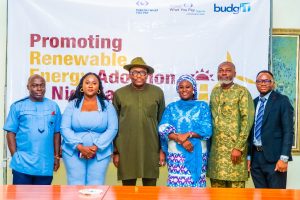
The roundtable explored diverse technologies, such as solar, wind, small hydropower, and bioenergy, as pathways to scale renewable energy adoption. Participants discussed community-based mini-grids, which provide centralised solar and battery systems for entire communities, and solar home systems for smaller, dispersed populations. Waziri highlighted successful projects, such as a 250 kW mini-grid and a 200 kW system powering schools, demonstrating the potential of decentralised solutions. The REA’s financing models include private sector-led initiatives like the Distributed Energy (DE) program, which supports mini-grids and solar home systems through performance-based grants. Other programs, such as the National Public Sector Solarisation Initiative (NPSSI) and the African Mini-Grid Program, focus on public institutions and agricultural clusters, respectively. Over the past five years, the REA has deployed 94 MW of PV capacity and disbursed $400 million in grants, with an additional $900 million in the pipeline. These efforts aim to stimulate demand and ensure sustainability by tying energy access to productive uses, such as powering small businesses and agricultural activities. In addition, the roundtable provided clarity on the various financing models available for off-grid projects according to their peculiar needs, especially in rural areas, ensuring that financial support mechanisms align with community-specific realities and capacities.
Participants raised several challenges hindering renewable energy adoption. Policy inconsistency was a recurring theme, with calls for clearer, harmonised frameworks to guide investments. The high cost of renewable energy systems, particularly for rural communities below the poverty line, was another concern. Stakeholders noted that while urban households are increasingly adopting solar panels due to unreliable grid supply, rural communities often lack the initial capital for such systems. There were also conversations around improving clarity on accessibility requirements and protocols for private sector players, which many stakeholders identified as a significant step in reducing delays and fostering more robust market participation. Environmental and safety concerns were also discussed, particularly regarding battery storage and recycling. The extraction and disposal of materials like lead and lithium pose environmental risks, and participants urged stricter regulations and local recycling infrastructure to mitigate these issues. Additionally, the potential of untapped renewable sources, such as geothermal energy from warm springs and bioenergy from waste, was highlighted as an area for further research and investment. The discussion also touched on the broader energy transition, with gas currently dominating Nigeria’s energy mix. Stakeholders emphasised the need to optimise existing hydropower plants, which are operating below capacity due to transmission constraints, and to explore biomass and waste-to-energy solutions, such as methane gas from sewage systems, to diversify the energy mix. Furthermore, participants shared insights to help resolve implementation bottlenecks related to the importation of renewable energy equipment, noting that policy adjustments and improved coordination among agencies could facilitate the flow of essential technologies into the country.
A key focus of the roundtable was the need for community-based renewable energy projects that address local needs, particularly for women and small-scale entrepreneurs. Participants noted that unreliable electricity hinders livelihoods, especially in rural areas where communities have been without power for years. The REA’s approach involves assessing community needs and tailoring solutions, whether grid extensions, mini-grids, or solar home systems, to ensure affordability and sustainability. Stakeholders also called for greater collaboration with subnational governments and local communities to ensure a just energy transition. The Ministry of Environment emphasised its bottom-up approach, citing initiatives like the clean cooking program, which distributed 3,000 stoves in grassroots communities. However, participants stressed the need for more inclusive policies that integrate renewable energy into state-level climate frameworks and prioritise local production of solar panels and batteries to reduce costs and create jobs.
The roundtable concluded with a call to action for all stakeholders to work collaboratively to achieve Nigeria’s energy goals. Key recommendations included the development of consistent, clear policies to attract investment and guide renewable energy deployment; investment in domestic manufacturing of solar panels and batteries, leveraging Nigeria’s lithium and other mineral resources to reduce costs and create jobs; prioritisation of community-driven projects that address local energy needs, particularly for women and small businesses, and ensure affordability through subsidies or innovative financing; expansion of research to include untapped renewable sources like geothermal and waste-to-energy, and improved data reliability for policy planning; and strengthened partnerships between government agencies, the private sector, civil society, and subnational governments to avoid silos and ensure inclusive implementation. The roundtable highlighted the transformative potential of renewable energy in Nigeria, not only for closing the electricity access gap but also for driving economic growth, improving livelihoods, and achieving climate goals. As Nigeria moves toward its 2030 and 2050 energy targets, the insights and commitments from this dialogue provide a roadmap for a sustainable, equitable, and inclusive energy future.
Key outputs from the roundtable
- Provided clarity on the various financing models available for off-grid projects according to their peculiar needs.
- Improved clarity on accessibility requirements and protocols for private sector players.
- Participants shared insights to help resolve implementation bottlenecks related to the importation of renewable energy equipment.
- Strengthened cross-agency and public-private collaborative efforts for renewable energy advancement.
- Emphasised the importance of additional engagement to improve knowledge around collaborative and complementary efforts by different stakeholders for renewable energy upscaling.
- Identified opportunities for renewable energy development from unconventional and non-traditional sources such as biological waste.
- Opened more channels for collaboration with MDAs, CSOs and private sector stakeholders for the advancement of renewable energy in Nigeria.
